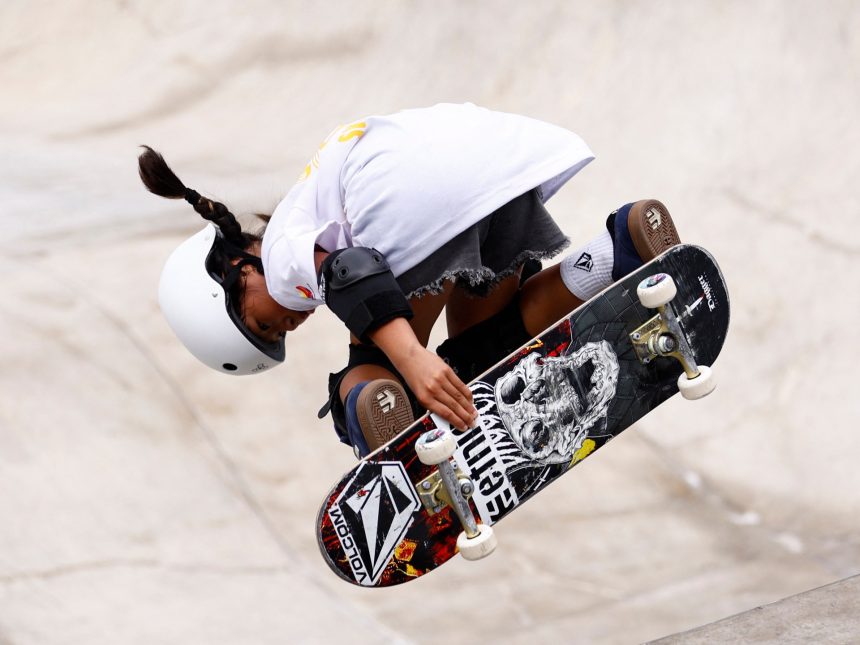[ad_1]
Mazel Paris Alegado, a nine-year-old skateboarder from the Philippines, made history at the Asian Games in Hangzhou, China, earlier this year – becoming the competition’s youngest-ever participant.
The prodigy made it all the way to the women’s Skateboarding Park Final on September 25.
Raising both her fists into the air jubilantly, Alegado smiled from ear to ear as she finished seventh.
Alegado’s aim now is to turn pro, and she has inspired many around the world with her exceptional skills in a nascent sporting career.
But her achievements have also reignited debates around age restrictions at global sporting events such as the Olympics.
Only 9 years old! 🛹💪
Mazel Paris Alegado is Team Philippines’ youngest member. She just finished seventh in the women’s skateboarding park final at the 2023 Asian Games in Hangzhou, China. We can’t wait to see what she does next!@OlympicPHI | @WorldSkate_news | @worldskatesb
— The Olympic Games (@Olympics) September 30, 2023
Skateboarding, in particular, has attracted many young female athletes.
Prior to Alegado’s record, nine-year-old skateboarder Aliqqa Kayyisa Noverry became Indonesia’s youngest athlete at the Asian Games in 2018.
In July 2021, 13-year-old Momiji Nishiya of Japan made history by becoming the first Olympic champion in the women’s street skateboarding competition, and the fifth-youngest gold medallist in Olympic history.
At the 2020 Summer Olympics, Great Britain’s Sky Brown – who reached the national skateboarding team at the age of 10 in 2019 – went on to win the bronze medal in the women’s park skateboarding event. She became the UK’s youngest-ever medal winner at the age of 13.
In other sports, Syria’s Hend Zaza became the youngest athlete in Tokyo 2020 when she competed in table tennis – which has no age restrictions – aged 12.
While skateboarding has no lower age limit in competitions such as the Asian Games or the Olympics, some countries impose age limits.
“Had Mazel Paris Alegado lived in Norway, she would not have been allowed to compete in the Asian Games,” said Kari Fasting, a professor emerita at the Department of Sport and Social Sciences, Norwegian School of Sport Sciences.
In Norway, nine out of 10 children are involved in one or more sporting activities, according to the Norwegian Olympic and Paralympic Committee and Confederation of Sports (NIF), an umbrella organisation responsible for organising national sports federations in the country.
Age restrictions implemented by the NIF mean Norwegian children cannot compete in national competitions until they are 12.
“Children in Norway, up to the year they turn 12, cannot participate in Norwegian Championships, European Championships, World Championships and equivalent competitions,” Fasting added.
She was referring to the NIF safeguarding measures implemented to create secure training environments, which nurture friendships and encourage children to choose what sports they want to participate in, and how long they want to train.
Some athletes told Al Jazeera about the thrills and the pressures young competitors like Alegado experience.
South African professional runner Viwe Jingqi competed in her first international run at the World Juniors in Kenya when she was 16 years old.
Jingqi was born in the village of Engcobo in the Eastern Cape province of South Africa and began running when she was 10 years old.
She became the world’s fastest female under-18 runner in 2022 after she set world records completing a 100-metre race in 11.24 seconds, and smashed a 40-year-old national youth record in South Africa when she completed a 200-metre race in 23.03 seconds.
“Representing your country at such a young age is so amazing,” Jingqi said, speaking to Al Jazeera.
“It’s an amazing thing that a girl [Alegado’s] age can go to such a championship.
“[But] mentally, if you’re a kid and you lose it’s going to affect you a lot so you need to be tough in every way.”
Now in her first year of university, the leap from high school to professional athlete has not been without its challenges for 18-year-old Jingqi whose running journey was inspired by her father and late brother.
“It’s two times harder,” Jingi said. “I went from running for my village or my disadvantaged home background, to moving to a better city where there were better facilities,” Jingqi said.
“It takes a lot of mental stability, emotional stability.”
Similar to South African double Olympic 800-metres champion, Caster Semenya, who won gold in the women’s 800 metres at the 2016 Olympic Games and is also a three-time world champion in the distance, Jingqi has also faced scrutiny over her appearance, particularly when she had to navigate puberty.
“I was a very muscular kid,” she said. “Normally, a girl is supposed to have curves – not arms as muscular as mine were,” she said. “I was bullied a lot by my peers.”
In the United Kingdom, 16-year-old college student Zahid Sufian was six years old when he began playing tennis at a community programme in Tower Hamlets, East London, at the encouragement of his mother.
He has competed in county, regional and national tournaments since he was seven, and he played in the United States when he was nine.
Now, he is navigating how to juggle his college studies alongside tennis training.
“When I was younger, it was much easier because I was homeschooled, so I was able to train in the day,” Sufian said.
“I was free to train in the morning, afternoons, evenings, whenever I wanted to really.”
Now studying for his A-levels at a sixth-form college with an inflexible timetable and more intense academic demands, Sufian admitted: “It’s tougher.”
Chaperoning his son to national competitions around the country before the coronavirus pandemic, Sufian’s father, Abu Sufian emphasised the importance of making sure young athletes like his son had outlets other than sports.
The need, he asserted, was to support and develop his emotional wellbeing and prevent burnout.
“If you look at the elite tennis players, whether it’s the men or the women, they have a team around them, and sometimes they’re playing cards, chess, video games. They’re doing other things outside of tennis to keep themselves distracted,” he said.
“If you are overly focused on one thing, which they are most of the time, it could have negative consequences.”
‘It’s likely to cause harm’
Over the years, a number of doping scandals, sexual abuse scandals involving coaches, and cases of young athletes misrepresenting their ages have further highlighted the risks and pressures in elite sport.
In 2022, a doping case involving then-15-year-old Russian figure skater Kamila Valieva at the Beijing Winter Olympics prompted the International Skating Union to raise the minimum age for athletes in its most high-profile competitions from 15 to 17, a change that would be phased in over three years ahead of the 2026 Winter Olympics.
Other age-appropriate alternatives to the Olympics have emerged.
In 2010, Singapore hosted the first Youth Olympic Games for young athletes aged from 15 to 18. The fourth edition is set to be held in Senegal’s capital, Dakar, which was delayed to 2026 because of the coronavirus pandemic.
Rob Koehler is the director general of Global Athlete, an athlete-led movement which champions the rights and welfare of athletes globally.
“The concept of the Youth Games was to offer a safe space for the world’s best young athletes to compete in an age-appropriate and safe environment, while at the same time being introduced to tailored education programmes,” he said.
Although age restrictions vary from country to competition, Koehler added that a universal standard for safeguarding standards and acceptable training limits should be enforced to ensure child athletes are being treated well.
“To place a nine-year-old in a competition with adults is unsafe no matter how skilled the athlete is,” Koehler said of Alegado.
“These are formative years for a growing child and to place them in such an environment during these development years is likely to cause harm.”
[ad_2]
Source link









